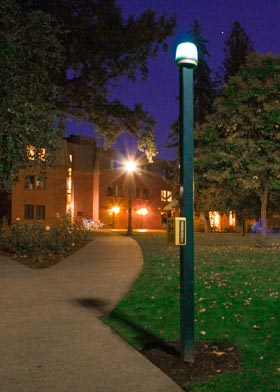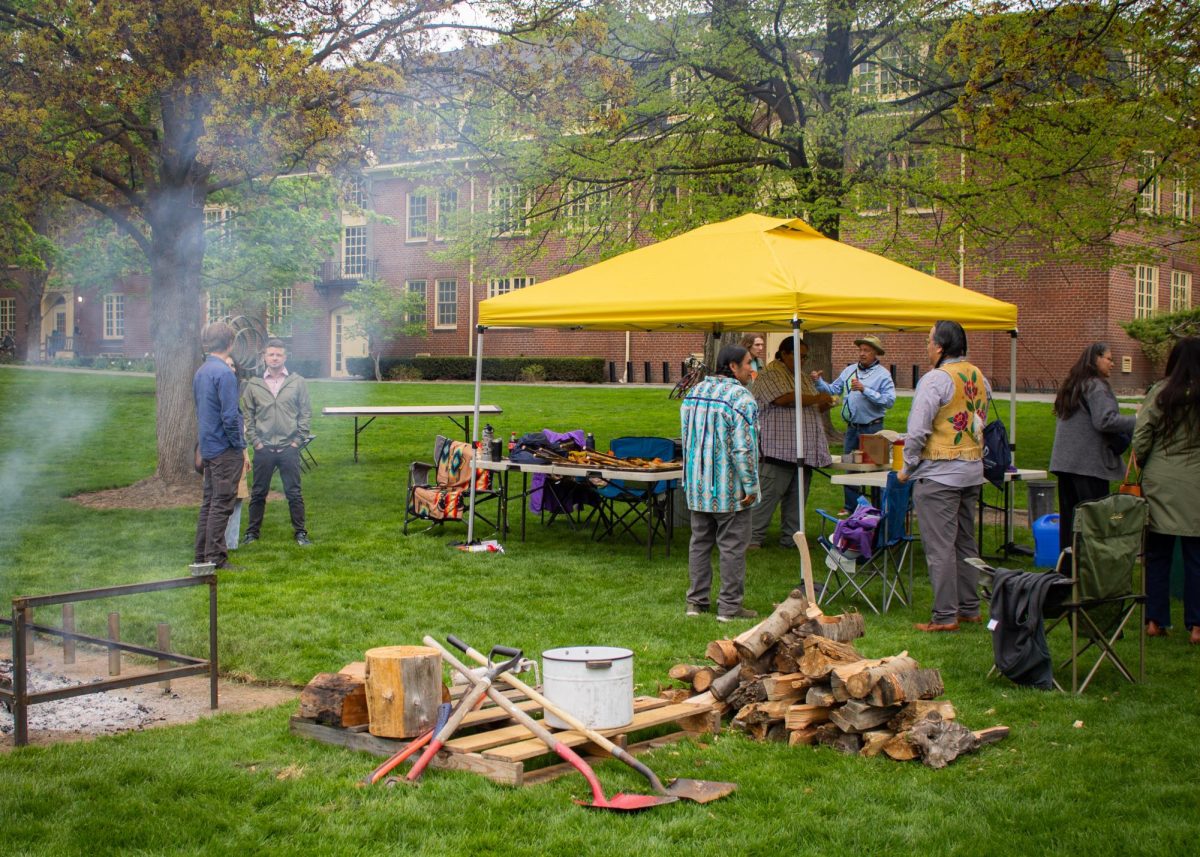In an annual security report released Thursday, Oct. 1, sent by Associate Dean of Students/Student Programs Barbara Maxwell to students, faculty and staff, the college provided a breakdown of crimes reported on and around campus during the most recent three-year period from 2006-2008. This data include instances of assault, theft and drug and alcohol violations, with several categories designated to reports of sexual misconduct.
Maxwell, along with campus security, the Walla Walla Police Department, residence life and other administrative offices, compiled the 25-page report in accordance with the Jeanne Clery Act, which requires all colleges and universities to disclose timely information about crime and security policies on campus.
According to the report, 2008 saw a sharp upswing in the number of reported forcible rapes at Whitman, with 13 instances occurring on-campus or in areas defined as adjacent to or accessible from campus, more than 3 times the number reported for 2007.
To find out more about what those numbers mean and what is involved in the process of reporting sexual assault at Whitman, The Pioneer sat down with Maxwell, who also serves as the college’s sexual misconduct prevention coordinator.
The Pioneer: What do you believe caused the number of reported instances of forcible rape to go up in 2008?
Maxwell: I don’t have any reason to believe that the number of instances has dramatically altered one way or another in the last couple of years. I think the number of people who have completed a reporting form is what has increased.
The Pioneer: What’s the value of completing the report, other than just following the law?
Maxwell: There’s value in counting the number of instances that happen on campus . . . This number, more than anything, [reflects how] the culture on this campus has changed such that a significant number of people feel comfortable confiding in someone else and actually reporting their incident. Would that have been true ten years ago? No.
The Pioneer: Many of the rapes reported last year took place off-campus. Why do you think that is?
Maxwell: There was nothing in 2008 that would say, ‘Ah-ha! That’s why so many happened off-campus.’ Most things that are going to fit into the category of forcible rape, which is really both completed and attempted [penetration], the thing it needs is a secluded place. So really, any space that’s secluded: and that could be a residence hall room, that could be a room in a fraternity, it could be an off-campus house or an apartment: has the potential for that to occur. Why so many seemed to happen off campus last year? I can’t answer that, I have no idea.
The Pioneer: What’s your message for students who are sexually assaulted?
Maxwell: I have a checklist of things that I will talk to a student about. And those will include things like safe housing: are you living in a place where you feel safe? Has this impacted your academics? Have you sought any kind of medical treatment? Do you need to? Have you thought about seeing anyone in the counseling center? Do you need or want to? And then we always talk about the judicial component. Part of that is, are you interested in reporting this to the police? If so, I’m happy to go with you. And then we’ll talk about reporting it to the college.
The Pioneer: What’s the difference between reporting sexual assault to the police and reporting it to the college?
Maxwell: In a criminal case, you [the individual accused of assault] could lose your rights, you could be incarcerated. At Whitman, the most significant thing that anyone can do to you is deny you the right to be a student here: we could expel you and just say, ‘you’re done, you’re not coming back,’ because we’re not a court of law; we’re not pretending to be a court of law.
The Pioneer: Why do you think some students choose to report sexual assault to the college but not to the police?
Maxwell: Often times they want something done, but when you start thinking this male or female student could end up in jail, a lot of times they’re like, ‘I don’t want to go there.’ That doesn’t mean that they don’t want the institution to make a statement and to do something . . . One of the things I hear frequently is, ‘I don’t want this to happen to anyone else.’ That’s probably the number-one thing I hear. The second thing is, ‘I want this person to learn that this behavior is wrong, that this was harmful, this was hurtful.’ I very rarely get, ‘I want an apology.’
The Pioneer: What’s your approach when speaking with victims about their options?
Maxwell: I don’t push. It’s not my job to push. But it’s definitely my job to inform and to talk to them about filing a report with the campus. And I can’t do that for students. I have the same responsibility of confidentially that the health center and the counseling center have, so no matter how much I think a student should report, I can’t do that on behalf of a student, nor would I ever. I can encourage a student to seriously think about it, and I do.
The Pioneer: In your opinion, how prevalent is sexual assault at Whitman?
Maxwell: I have had certain women say, ‘you know, Barbara, if every man and every woman at Whitman reported every time that they were inappropriately groped, you’d have hundreds, hundreds of these slips on your desk every Monday. So they’re probably right. There are certain behaviors that have become so commonplace that I think the majority of students shrug them off.
The Pioneer: What about men reporting sexual assault?
Maxwell: I have had two male students who’ve come in to talk to me specifically about their incidents, and neither of those students chose to go forward with any kind of conduct option . . . my guess is we’re probably still very, very under-reported in terms of the number of males who it occurs to.
The Pioneer: Why do you think some students come talk to you weeks, months or even years after being assaulted?
Maxwell: Sometimes it’s just having someone help you make sense of what happened. For some students it’s very otherworldly, like, ‘did it really happen? Did this thing really happen to me?’ And you know it did, but it still feels almost like it happened to someone else . . . I’ve had people talk about trying to run, but it feels like you’re in waist-deep water and no matter how fast you go, you don’t move.
The Pioneer: Since you started work at Whitman, how many cases of sexual assault do you recall being prosecuted?
Maxwell: I got here in the summer of ’90, but I do think in that ’89-’90 school year we had two Whitman students who did report to the police and I think that whatever court proceedings happened were in that spring before I got there. They took the stronger case first and I believe it lost, so they never took the second case. As far as I know, [during] my twenty years that’s the only one that ever made it all the way to a court . . . it doesn’t happen very often.
The Pioneer: Why do so many students choose not to report sexual assault?
Maxwell: Fear is still the number-one obstacle and it’s the fear that other people will find out and judge them. And I think as advanced as Whitman is, there’s still a significant number of people that buy into rape myths. If somebody’s been sexually assaulted, the first instinct is to figure out what he or she did to have that happen to them. It’s like if you went downtown and you got mugged, and you came back, people wouldn’t say, ‘well, why did you have your computer with you? Why did you have your purse? Why did you have money? How stupid of you.’ We wouldn’t say that. We’d say, ‘oh my God, I can’t believe that, are you okay?’ I mean, immediately the blame would be on the person that harmed you. In any kind of sex offense case, we’re not there yet. We’re getting better, but we’re not there. We still have too many people that immediately blame the person that was harmed, like, ‘what’d she do, what’d he do, why did you drink that, why did you go there, what were you thinking?’ It’s the only crime where the victim has to prove that he or she isn’t guilty.
The Pioneer: What’s Whitman’s ultimate goal in addressing sexual assault?
Maxwell: Our goal shouldn’t be to have any better of a policy than we already have or to put into place too many more resources because that requires somebody who’s already been harmed. We need to put our efforts and our resources into prevention.
For more information on Whitman’s sexual misconduct policy, visit http://www.whitman.edu/content/smrn.
The annual security report is also available online at http://www.whitman.edu/content/security/annualreport.










